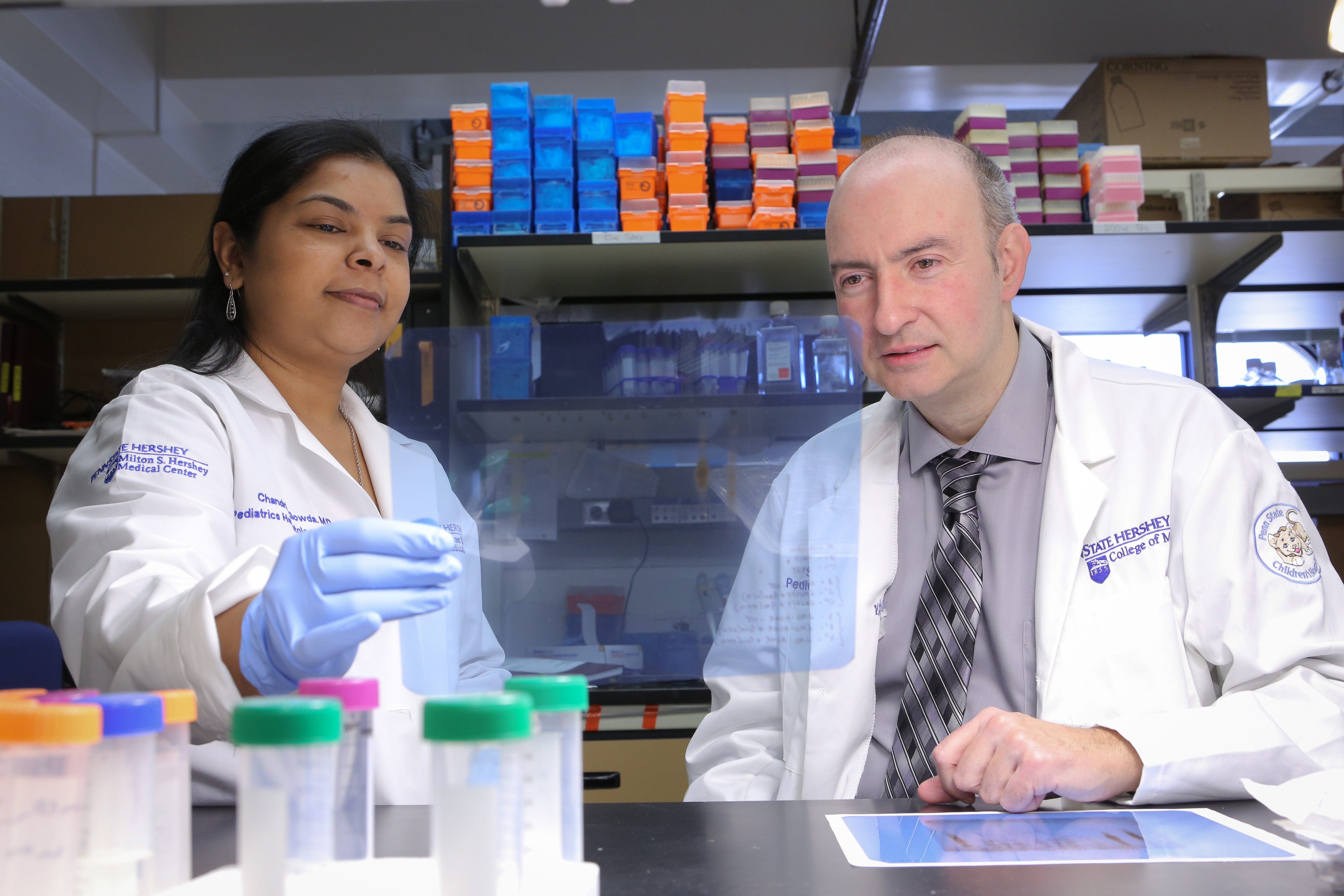Gowda receives 2017 Young Investigator Award

Dr. Chadrika Gowda with her mentor, Dr. Sinisa Dovat.
Less than four years after a href=”https://pennstate.pure.elsevier.com/en/persons/chandrika-gowda”>Dr. Chandrika Gowda completed her fellowship with Penn State Health Milton S. Hershey Medical Center and Penn State Health Children’s Hospital, she was already being recognized as one of the nation’s top young medical researchers.
Dr. Gowda, an assistant professor of pediatrics at the time, was a recipient of the prestigious 2017 Young Investigator Award from the American Society of Pediatric Hematology/Oncology (ASPHO), an annual award that recognizes excellence in research in the field. (Dr. Gowda has since been promoted to associate professor.)
Dr. Gowda credits her fellowship experience for helping her evolve into one of the country’s leading young researchers. When she began her fellowship in 2010, she recalled, she had no research background. But a year later, when she started her work under mentor Dr. Sinisa Dovat — himself a 2001 recipient of the Young Investor Award — an entirely new world opened up. Dovat’s lab studies pediatric cancer and is funded by Four Diamonds
“The most helpful part at that point was to be able to talk to all the research mentors that are available through the Four Diamonds lab,” she said, adding that their encouragement and assistance in learning the techniques combined with the program’s protected time to conduct research helped her project grow.
“I think that that’s unique to our program,” Dr. Gowda said of her fellowship experience. “During training years, it’s very important to have the protected time along with your clinical responsibilities taking care of your patients.”
Dr. Valerie Brown, director of the pediatric hematology/oncology fellowship program and a 2003 recipient of the Young Investigator Award, said a significant focus of the fellowship program is research.
“We’ve tried to do our best to train our fellows to not only take outstanding care of our patients with the state-of-the-art therapies, but also we encourage them — and sometimes expect them — to be the ones developing those innovative, cutting-edge therapies that one day will hopefully be part of the standard of care and conventional care,” she explained.
Dr. Gowda estimates she spends about three-quarters of her time on research, which currently focuses on treating a specific subset of pediatric leukemia patients — the work that earned her the esteemed Young Investigator Award.
“Leukemia is the most common cancer in children and almost 20 percent — that is one out of every five — of kids relapse or are non-responsive to chemotherapy. And of those kids, half of them die from the disease,” Dr. Gowda explained. “And this is despite all the known chemotherapy that we use, including stem cell transplant, which are very toxic even if they survive treatment.”
Her goal is to develop a combination of less toxic medications that can target tumor cells in children for whom the current therapy methods don’t work.
“It’s very personalized medicine,” she added.
Dr. Gowda will showcase her research at ASPHO’s annual meeting in Montreal, which she cited as the “best venue I can get to present my work,” to more than 900 pediatric hematology/oncology researchers from around the world.
“[The Young Investigator Award] gives one a platform and an audience,” said Dr. Brown. “It can stimulate collaboration, discussion, and, frankly, some of the people reviewing grants will be in that audience. If they’ve heard about your research in more detail, that can help you substantially.”
Dr. Dovat echoes her sentiment.
“It’s something that sticks in your career,” he said of the award, adding that it will also help boost Dr. Gowda’s chances of acquiring critical grant funding to continue her important research. “As far as I know, this is the very first time that any fellowship trainee in the Department of Pediatrics has received this award. We’re a younger medical school, a younger program. This actually means national prestige for the program.”
If you're having trouble accessing this content, or would like it in another format, please email Penn State Health Marketing & Communications.
